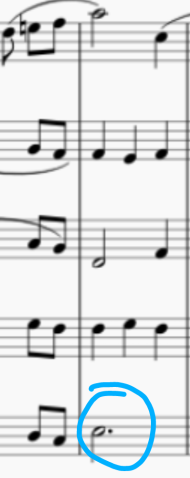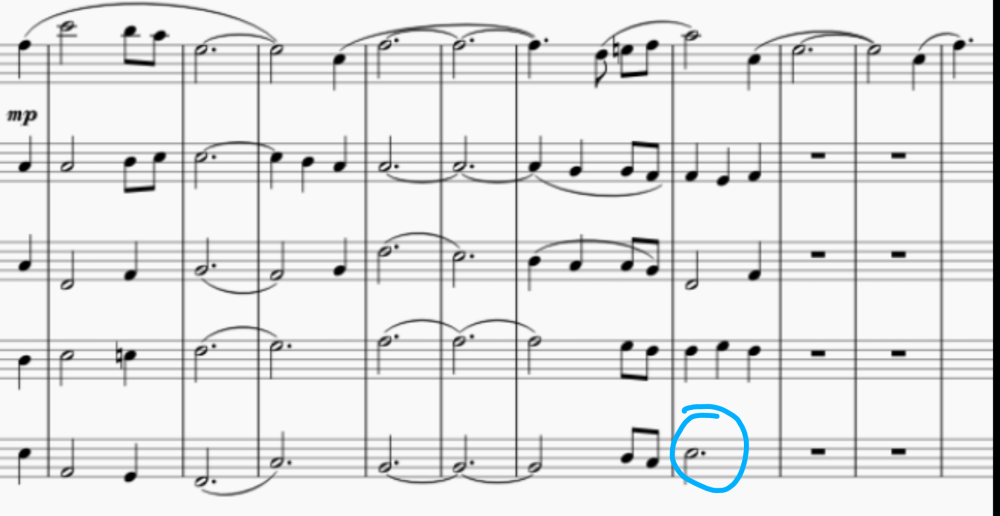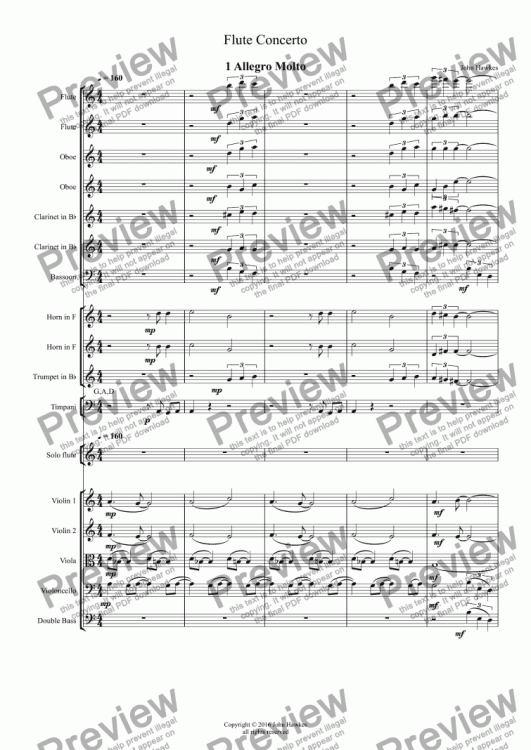All Activity
- Past hour
-

Gothic Tarantella for Violin and Clavichord
Monarcheon replied to PeterthePapercomPoser's topic in Chamber Music
Cool stuff. I'm gonna guess you were quoting Three Blind Mice; I haven't seen the show. If not—well, you might have reinvented the wheel. A couple things: 1. I'm not sure how I like the quiet rolls at the ends of phrases. I know they're possible, but they're gonna be a little awkward and take time, delaying the nice quiet resolution. If I were to suggest a change, I'd maybe consider doing a two note thing (like a grace note + final note kinda thing), with some rolled figure in the keyboard to supplement the effect. 2. I'm guessing you want your many grace notes to connect to the triplet figure that come after them? I'd suggest being really explicit about that if so; string players are literal (e.g., don't bother giving string players phrasing slurs). 3. mm. 23–24 and 72–73: My brain kind of wants to hear some of these plucked for some timbral variety, especially since the keyboard takes over there. Something like the first note is arco, the others are plucked, until the anacrusis to the next bar. 4. I don't think your slow section needs a key signature change, personally, especially because I don't hear your key centers as the implied I–bVI–IV of A-flat major. Think of it like musical theater: you change keys so goddamn much that sometimes it ain't worth it. (Also F-flat major is kinda obnoxious to read). Nitpicks: a. Could use some more courtesy accidentals, when used in succession. For instance, throw a courtesy in m. 41 just for funsies. b. D/C double stop is kinda annoying, and very sad that it moves to Eb/A, which can't use the open A. I see the voice leading, it could maybe be a little more practical, though. c. Make sure dynamics are on the notes played. I think we really only put dynamics if it's "n" at the end of the note's duration. Maybe it's for the playback. d. Last measure: take out the rests in the right hand, since it's written like the right hand is doing a register transfer to a lower octave. Really fun stuff. Congrats. - Today
-
Tunndy started following the 3rd Movement Of Moonlight Sonata orchasrated
-
For your interested ..... improved harmony, better support for the singers, removed parallel motion, some tweaks in the piano score. Here's the finished version .... Sing It Loud 9-25-25.mp3
-
Uton mid blisse dancian! Lovely work ... Mark
-
.thumb.png.8b5b433a341551e913a34392660bc95b.png)
Oboe Concerto
PeterthePapercomPoser replied to GospelPiano12's topic in Incomplete Works; Writer's Block and Suggestions
In measure 4, over the Bb chord you have parallel 5ths between Horn (concert G and Ab) and Bassoon (C and Db). Also in measure 6, beat 3 you have the Horn on concert C while the Bassoon plays Bb - is that intentional? Looks great so far! -

Nocturne in C-sharp minor
Thatguy v2.0 replied to Henry Ng Tsz Kiu's topic in Piano Music, Solo Keyboard
Awesome Henry! I bet 16 year old Henry couldn't play like this recording 😄 Well done, it's good to hear music from you again! -

Nocturne in C-sharp minor
ComposedBySam replied to Henry Ng Tsz Kiu's topic in Piano Music, Solo Keyboard
Wow! The piece unfolds and reaches climax quite effectively. I can totally see how the music itself demanded a modulation to F major there lol—and it works great! The fugato section was a nice touch with theme A as the episode and theme B as the subject. I like how the climactic section cools down with plagal harmonies iv—I, gives a bittersweet aftertaste to all the previous agitation. That’s why the decision to end it on the major version of the tonic was a good choice. Such a competent and fluent work! -

Oboe Concerto
GospelPiano12 replied to GospelPiano12's topic in Incomplete Works; Writer's Block and Suggestions
Oh my, that's definitely it. 😮 Wrote this melody for the French horn to play as a prelude-esque intro. I tried to give nods to the main melody,but I also don't want to make it too redundant. Any feedback there? I struggle a bit with melody writing, especially when I've already written some material that I just love lol. -

Nocturne in C-sharp minor
Henry Ng Tsz Kiu replied to Henry Ng Tsz Kiu's topic in Piano Music, Solo Keyboard
Thx Vasilis! Henry -
Vasilis Michael started following Nocturne in C-sharp minor
-
Nocturne in C-sharp minor
Vasilis Michael replied to Henry Ng Tsz Kiu's topic in Piano Music, Solo Keyboard
This is incredible. So inspired and perfect structured. Well done my dear Henry. 👏 -
PeterthePapercomPoser started following Layne
-
PeterthePapercomPoser started following Nocturne in C-sharp minor
-
.thumb.png.8b5b433a341551e913a34392660bc95b.png)
Favorite Musical Book Quotes?
PeterthePapercomPoser replied to PeterthePapercomPoser's topic in Composers' Headquarters
I'll quote for you another passage from Chapter 32 of Gabor Mate's "In the Realm of Hungry Ghosts" - a book about addictions. The author talks about his addiction to buying CDs of orchestral and classical music: -
Henry Ng Tsz Kiu started following Nocturne in C-sharp minor
-
Hi long time for no posting! I decided to post an old work of mine.This Nocturne in C-sharp minor is a juvenile work of me as a 16 year old. I didn't think much at the time of composing, but I did write in the style of Chopin Nocturne then. And then a sudden thought caused me to have a 1st try in fugue in 2:35! I revised the work recently to improve on some voice leadings and transitions except passages after the fugato, but retained as much the original intention as I can as a 16 year old then. The work, even though as immature as it is, does reflect some of my feelings then. Here is the Youtube video and the score of the piece: (Final Draft) Nocturne in C sharp minor.pdf This work can be regarded as in a rondo structure: 0:00 1st part(A), typical Chopin Nocturne texture. Don't know why I modulated the music to F major but the music did so himself... 0:58 2nd part(B) Main melody in F major, but with a new b motive in b.31-32 1:35 3rd part (A') The main melody in the original key can't wait to enter... Gets more agitated and cools down. 2:35 4th part (B'). A fugato using motive b as subject and main melody as episode, modulates once more to F major 3:57 Last part and coda (A''): The A section returns with some registeral change, then gets more agitated. 4:29 is the climax of the piece which is my favourite too, I like the agitation in it. 4:47 starts the coda and finally the mood cools down and ends in tonic major. I played the recording myself. I do make one major slip in 3:22 but the recording is otherwise good enough for me. Feel free to leave comment below! Henry
- Yesterday
-
.thumb.png.8b5b433a341551e913a34392660bc95b.png)
Oboe Concerto
PeterthePapercomPoser replied to GospelPiano12's topic in Incomplete Works; Writer's Block and Suggestions
I find it hard to parse what you want the harmony to be in this measure. And there is a parallel 4th between Violin I and Contrabass across the measure line (C to Eb in Contrabass, F to Ab in Violin I). Maybe that might also be a source of your dissatisfaction? -
@PeterthePapercomPoser thank you! I agree, I already look back at it and cringe a litle bit, though I like it quite a bit for a attempt. honestly I agree with you on when the piece should have finished, I just had this last phrase as an idea in my head for a while and I kind of wanted an exuse to use it
-
Alex Weidmann started following Requiem pro mundo moriente
-
Requiem pro mundo moriente
Alex Weidmann replied to BipolarComposer's topic in Orchestral and Large Ensemble
I listened to the opening movement, and loved it! It's sparse and haunting, then shifts halfway through to become mysterious and tense, like a Film Noir. Congrats on completing this major work. Will try to listen to the other movements when I have time.- 1 reply
-
- 2
-

-

-
EspeciallySpectral joined the community
-
.thumb.png.8b5b433a341551e913a34392660bc95b.png)
Solo de lune for (my) voice and piano
PeterthePapercomPoser replied to Krisp's topic in Choral, Vocal
Hello again @Krisp! I really love the lyrical melody of this one! And the constant unpredictable modulations and free tonality is really great and always keeping the listener on their toes! Thanks for sharing this thoroughly enjoyable song! P.S.: I also liked the very impressionistic introduction! -
.thumb.png.8b5b433a341551e913a34392660bc95b.png)
Concerto in C for Flute and Orchestra
PeterthePapercomPoser replied to J. Lee Graham's topic in Orchestral and Large Ensemble
Hello @J. Lee Graham and welcome back to the forum! Wow! What a wonderfully accomplished work! I am glad that despite feeling "unworthy of the material" that you managed to finish it after more than 20 years!!! I also have had such an experience. I started my Variations on "Deck the Halls" for Piano and Orchestra back in the 2000's as well, over a decade before when I ended up finishing it. And it was only thanks to the fact that I learned to write music on paper that I managed to have the discipline to finish it. I totally understand the sentiment! It is hard to limit yourself when writing for period instruments when you know that superior versions of the instruments would in fact have capabilities that would very much facilitate the music in question for the composer. I think I would also leave the piece as-is knowing that there do in fact exist versions of the instruments with the capability to actually perform the piece live, which is ultimately all that I would care about. I have to say that my favorite movement is the Polonaise! What a delight to hear someone include this stately Polish dance in a concerto! I am Polish myself and have danced the Polonaise as a youth in a Polish Folk Dance Ensemble. The dance has all the pomp and nobility of the spirit of Poland! I think it was also you who remarked that your favorite National Anthem is the Mazurek Dabrowskiego in an old thread I read somewhere. I actually have always dreamed of creating a mash-up of the Mazurek with the American National Anthem to create a kind of "Polish-American Heritage Anthem". We'll see if that ever comes to fruition! Thanks for sharing this wonderfully bright piece! I thoroughly enjoyed it! -
Hey @L.S Barros! Nice galliard! It does sound very dance-like and jovial! I have a few Baroque-style dances that I've written myself that are in more of a modern style (for string orchestra), but I've never written a galliard or pavane or any of those old Renaissance dances. But I'd really like to - I'm always fascinated by the idea that one could write a dance suite or longer orchestral work with all different kinds of dances from throughout the ages, as well as more modern dances like the tango or salsa. Thanks for sharing! I really like the addition of instruments half way through! And the instruments sound like legitimate early-music instruments! Great job!
-
Hey @Tunndy and welcome to the forum! I think that both the melody and harmony in this piece are quite unique and personal to you! The piece starts quite underwhelmingly and gives the listener time to get used to its unique melodic content and the waltz rhythm. Then it gets really pompous and dynamic! And despite it being undoubtedly a piece that you will consider a part of your juvenilia, it still shows great talent and musical sense. I think the only part that I find objectionable is that the piece sounds like it's ending for too long. To me the piece sounds like it could have ended at 1:30, but then it keeps going, repeating a phrase which to me seemed a little redundant. But that's just my 2¢. Thanks for sharing! P.S.: Please consider leaving a ❤️ or a 🏆 reaction for the people (including myself) who have gone through the trouble and donated their time to review your music. It really helps us feel appreciated and keeps the forum a healthy place for people to share! Thank you!
-
.thumb.png.8b5b433a341551e913a34392660bc95b.png)
Piano Suite No. 1 | No. 1: Whimsy
PeterthePapercomPoser replied to ferrum.wav's topic in Piano Music, Solo Keyboard
Hey @ferrum.wav! Great whimsical piano piece! It really feels organically conceived with a smooth and uninterrupted stream of musical consciousness! I think, pertaining to the above discussion about writing a piece completely without any variations, I think that's really difficult. One of the biggest determinants of whether a melodic piece is going to entertain the listener and stay in the musical consciousness is the constant interplay between unity and variety. For this reason it's always really hard (especially for me) to write music in a through-composed form. I always want to return to some kind of variation (at least) of the main theme. This brings both unity and variety at the same time. The only problem is that sometimes I write pieces where the variations aren't different enough from each other and so they don't bring enough variety and hence sound boring! (LoL) On the other hand, if there's too much variety then the piece could start to sound nonsensical to the listener, like the piece lacks thematic/motivic associations and hence doesn't build up a bank of memorable musical moments (unity). I really love how the piece feels like you improvised it - you really have a unique musical style that comes through here - it sounds like a fantasia. I've listened to it multiple times while writing this review and I've enjoyed every minute of it! Great job and thanks for sharing! -
PeterthePapercomPoser started following John Carpenter's Halloween - A Symphonic Arrangement
-
Layne changed their profile photo
-
Layne started following John Carpenter's Halloween - A Symphonic Arrangement
-
Hi all! It's officially October, which means it's time for some spooky songs. Almost each year I challenge myself to make a new arrangement of John Carpenter's classic theme from Halloween. It's always been one of my absolute favorite horror films, so it's truly a great joy to jump into this main theme and make it my own in composing. Would love to hear some feedback! I have tried a few new things in this song as I continue to experiment with techniques. I used mostly Native Instruments - Symphony Series, with support from Spitfire Audio's Originals Cinematic Soft Piano. Hope you enjoy the listen!
-
Thank you so much for all the kind words! Writing sheet music is something I am working on! I learned to compose using DAW software, so it doesn't always export the way I've written it to be in the DAW when using that. I do want to learn that side of things though. So glad you enjoyed the listen!
- Last week
-

Oboe Concerto
GospelPiano12 replied to GospelPiano12's topic in Incomplete Works; Writer's Block and Suggestions
Been experimenting with this & trying to reharmonize the material, so it doesn't become so redundant. However, I'm not in love with that Eb bass note there. -
UncleRed99 started following Concerto in C for Flute and Orchestra
-

Concerto in C for Flute and Orchestra
UncleRed99 replied to J. Lee Graham's topic in Orchestral and Large Ensemble
Not much to say in critique of this work. Very Neo-Classical and elegant 🙂 Awesome work. I'd love to see this performed live! -
Alex Weidmann started following Concerto in C for Flute and Orchestra
-
Concerto in C for Flute and Orchestra
Alex Weidmann replied to J. Lee Graham's topic in Orchestral and Large Ensemble
Nice work! Just have one notational point. The staff for the soloists part in a concerto, should always be positioned directly above the 1st violins (see attached image).






